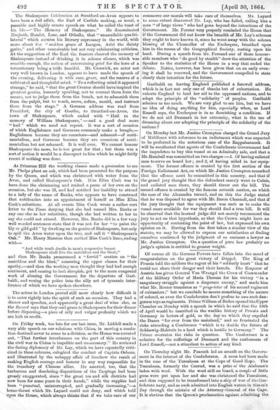On Monday last Mr. Justice Crompton charged the Grand Jury
of Middlesex with reference to an indictment which was expected to be preferred in the notorious case of the Rappahannock. It will be recollected that agents of the Confederate Government had the impudence to buy this vessel at an Admiralty sale, and that a Mr. Rumball was committed on two charges :-1. Of having enlisted men to serve on board her ; and 2, of having aided in her equip- ment. The former offence is created by the first section of the Foreign Enlistment Act, on which Mr. Justice Crompton remarked that the offence must be committed in this country, and that if the grand jury thought that the defendant merely went to Calais, and enlisted men there, they should throw out the bill. The second offence is created by the famous seventh section, on which the case of the Alexandra turned, and on this the Judge stated that he was disposed to agree with Mr. Baron Channell, and that if the jury thought that the equipment was such as to make the vessel more available for war they should find a true bill. It will be observed that the learned judge did not merely recommend the jury to act on that hypothesis, so that the Crown might have an opportunity of contesting the point of law, but expressed his own opinion on it. Having from the first taken a similar view of the statute, we may be allowed to express our satisfaction at finding ourselves confirmed by the judgment of so eminent a lawyer as Mr. Justice Crompton. On a question of pure law probably no judge's opinion is entitled to greater weight.


































 Previous page
Previous page